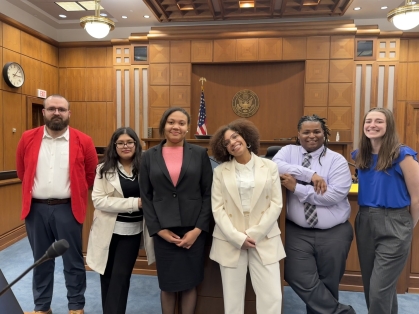Rutgers Law Students Coach Camden High Schoolers to National Competition

Four Camden students from Brimm Medical Arts High School and Camden High School gathered for the first time as a moot court team in fall 2024. Their goal? To learn about the Constitution, how to argue a case, and prepare for a national competition set for March 2025 in Baton Rouge. Two of the students spoke English as a second language, one was too shy at first to introduce herself to the Rutgers Law School students mentoring the team, and none had any formal civics education. Yet, by the end of the competition, all displayed extensive public speaking and reasoning skills.
Camden High senior Nehemiah James even finished as second runner-up in the national competition and won the Artistic Expression Award for his painting inspired by the competition topic. “The whole process was fun, from practicing cases to giving the mock presentations,” he says. “The most important part, though, was the people who were there—we had two amazing counselors and two amazing teachers that made everything possible—and the fact that we were all growing together. If I was asked to do it all again, I would in a heartbeat.”
This impressive journey was made possible by the Marshall-Brennan Constitutional Literacy Fellowship, a program started over 20 years ago to connect law students with local high schools and improve civic literacy and understanding of the Constitution.
Rutgers Law 2L student Dawson Kipphut became a Marshall-Brennan Fellow because he loves teaching. But he also recognized that it would help him develop the skills he would need as he pursued his goal of becoming a public defender. "The average American has a seventh- to eighth- grade reading level," Kipphut says. “Learning how to explain legal topics, the Constitution, and rights in simple terms is something I'll need to do every day as a public defender."
Alongside fellow Rutgers Law 2L student Samantha Coffman, Kipphut spent the fall semester teaching the students about oral arguments, how to build their cases, and the First Amendment, since the moot court topic questioned how a high school may punish a student’s off-campus online speech. Throughout the winter, the students practiced several times per week.
"The more they practiced, the more confident they became," Coffman explains. "Dawson and I acted as tough judges to prepare them, so by the competition, it felt easier than our practice rounds." Kipphut adds jokingly, "They even complained that the competition judges didn't ask enough questions—they were ready to show off!"
While Kipphut and Coffman gained valuable teaching experience and developed deeper connections with the Camden community, the high school students arguably gained even more. "The students gained confidence, improved their public speaking, and built great relationships with the Rutgers Law students who became role models," says Sabrina Dormer, a social studies teacher at Brimm High School.
“I’m so genuinely proud of everything they did,” adds Barbara Gardner, Camden High’s English department chair. “For me as a teacher, it meant to so much to watch them grow from having an intense fear of public speaking to getting up and doing it competently and confidently in an intimidating setting like a federal courthouse.”
Perhaps most importantly, Gardner says the experience also exposed her students to their peers across the country, travel, and the opportunities available to them after graduation. "Sometimes, my students look around and don’t know what’s next for them," Gardner says. "By participating in this program, they start to see new possibilities. It really broadens their horizons."
Indeed, one of Kipphut’s goals was to show the students that studying law, while challenging, is something they could achieve with hard work. "At first, the students did not know where to start with making legal arguments or sounding like a lawyer. They did not know if they could do it well, if at all, or if it was even something they would want to pursue," he says. "But by the end of the competition, they learned that not only was it something they could do, but something they could do well. One student found a passion for law, and another decided he wanted to pursue it after graduation."